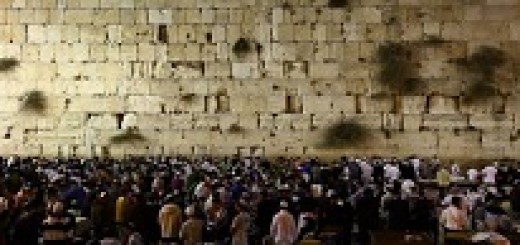By Avner Friedmann
Egypt is a country that has very little rainfall. Rather, it depends heavily on the Nile for the irrigation and fertility of its soil. From ancient times, until the Aswan dam was opened in 1970, Egypt has relied on the annual flooding of the Nile for its economic survival and it is specifically this fact; that Egypt is not as dependent on rainfall as other countries, that made it the first great civilization of the ancient world. The river not only provided much needed water to the desert nation, but it also deposited very fertile soil carried from upstream, deep in equatorial Africa. Because of this great dependency, in ancient Egypt they worshipped the River. Moreover, they worshipped Pharaoh as the god and master of the river. Therefore, when bringing about the plagues upon Egypt, Hashem chose to start by striking the Nile first and turning its waters into blood.
This was so that Pharaoh and his subjects should see with their own eyes that in reality Pharaoh had no control of the waters of the Nile altogether. The water turned to blood, killing all the fish as soon as Moshe issued the Divine command; as it is written[1]: “So said Hashem…behold, with this staff that is in my hand I shall strike the waters that are in the river, and they shall change to blood”. Hashem told Moshe that when Pharaoh would see him performing miracles that defied nature, he would begin to understand that there truly is a G-d above him who rules over all[2].
How do we know that Pharaoh made himself into a god? The prophet Ezekiel tells us[3]: “Pharaoh, king of Egypt, the great serpent that crouches within its rivers, who says, “The Nile is mine and I made myself” – meaning, “I created myself and the Nile river”.
The obvious question is how could the Egyptians believe such nonsense? However, it is explained[4] that the Egyptians were deeply into Astrology and believed that the physical world receives its influence from the stars. When they saw that a person was wise or successful, they attributed all his power and fortune to the stars and constellations. They also believed that whatever was written in the stars was “etched in stone”, so to speak, and that no one could ever prevent it from happening. Therefore, when they beheld a ruler of such absolute power as Pharaoh, they attributed it to him being godly. Pharaoh was so self-centered, arrogant and narcissistic that he started to believe some of his own “propaganda” too. He started to believe that he was god-like and this was his mistake.
Actually, it was Yaakov who originally blessed Pharaoh that the Nile should come up to him and overflow whenever Pharaoh approached it. Rashi explains that since that moment, Pharaoh would customarily come to the river early every morning where the water would rise up towards him and irrigate the land[5]. Included in the blessing was that as the water subsided, the fish would become caught in the reeds to be collected by the Egyptians. Pharaoh pretended that all this was due to his own power and he proclaimed himself as a god. Also, to convince the masses that his claims were true, he pretended that he never had to perform any bodily functions. This was the real reason he would go so early every morning – it was to relieve himself unobserved! Because of this Hashem chose this particular time and place for Moshe to confront Pharaoh.
HaShem told Moshe[6]: “go to Pharaoh in the morning, behold! He goes out to the water, and you shall stand opposite him at the river bank and the staff that turned into a snake shall you take in your hand. You shall say to him, “Hashem, the G-d of the Hebrews, has sent me to you, saying: ‘Send out My people that they may serve Me in the wilderness; and behold, you have not hearkened until now. Therefore, so says Hashem, through this shall you know that I am Hashem”.
However, we could ask, why couldn’t Moshe meet Pharaoh in the palace? Wouldn’t that be a more honorable place to give him HaShem’s message? The Ohr HaChaim answers that it was to show Pharaoh that Hashem knew his secret, as the prophet Jeremiah said[7]: “Thus says HaShem. Can a man hide in concealments that I will not see him? Do I not fill the heavens and the earth?”
Picture this scene[8]: Before dawn, after not having relieved himself for 24 hours, Pharaoh is secretly rushing to the riverbank to make his deposit. There, he encounters Moshe, who greets him and says, “good morning”. Pharaoh is shocked and bewildered. “What are you doing here?” “I came to speak to you in the name of Hashem”, replies Moshe. ‘First I must go to the river so its waters will rise and irrigate the fields”, says Pharaoh, “I’ll be back in a jiff.” He can hardly hold himself and turns to go. “Oh no you don’t! First you must hear HaShem’s message!” says Moshe sternly. “Hurry up and tell me!!” begs Pharaoh. But, as we know, Moshe has a speech impediment. He is “heavy of mouth and heavy of speech[9]”. “Oy Vey. The last thing I need now is a stutterer”, thinks Pharaoh. “Let me tell you a secret”, he says to Moshe. “I need to go to the bathroom – URGENTLY!!! “Go!” Concludes Moshe, “I’ll meet you later in the Palace. But, just remember. You and I know who you are and what you’re really all about.”
Later that day Moshe and Aaron arrive at the Palace. All the gates of the Palace are guarded by chained lions[10]; no one ever enters without permission. Moshe and Aaron approach the lions, but instead of attacking, they lay at their feet, licking them like puppies. They release the chains of a couple of lions and enter the palace with them. Pharaoh is there, meeting with his advisers. Stunned, Pharaoh asks: “How did you get in?” “Through the gate”, they answer. “Where are the animals that guard the gates?” asks Pharaoh. Moshe turns and invites the lions into the room. Frightened to death, Pharaoh jumps onto his throne and wets his pants. This marked the end of Pharaoh’s career as a god.
HaShem says to Israel[11]: “The haughty ones I put down because they were distant from Me, and I raised you, the low and humble ones, and carried you on “the wings of an eagle”[12]. It is not power or wealth, but closeness to Hashem that makes a person. Ultimately Hashem exposes the arrogant and shows honor and praise to the humble. May arrogance and deception be removed from us forever. May HaShem’s kingship be revealed over all His creatures and may we finally be redeemed with the true and complete redemption, speedily in our days, Amen
[1] Vaera 7:17.
[2] Tanchuma 9, 13, 14.
[3] Vaera 29:3.
[4] The Anaf Yosef commentary on Tanchuma 9 brought in the name of the Yefei Toar.
[5] Vayigash 47:10.
[6] 7:15-17.
[7] 23:24.
[8] By Rabbi Shlomo Levinstein (from Midrashim).
[9] Shemot 4:10: “Heavy of mouth and heavy of speech”.
[10] Yakut Shimoni Remez, Perek 5, 175-176.
[11] Tanchuma.
[12] Yitro 9:4.






















